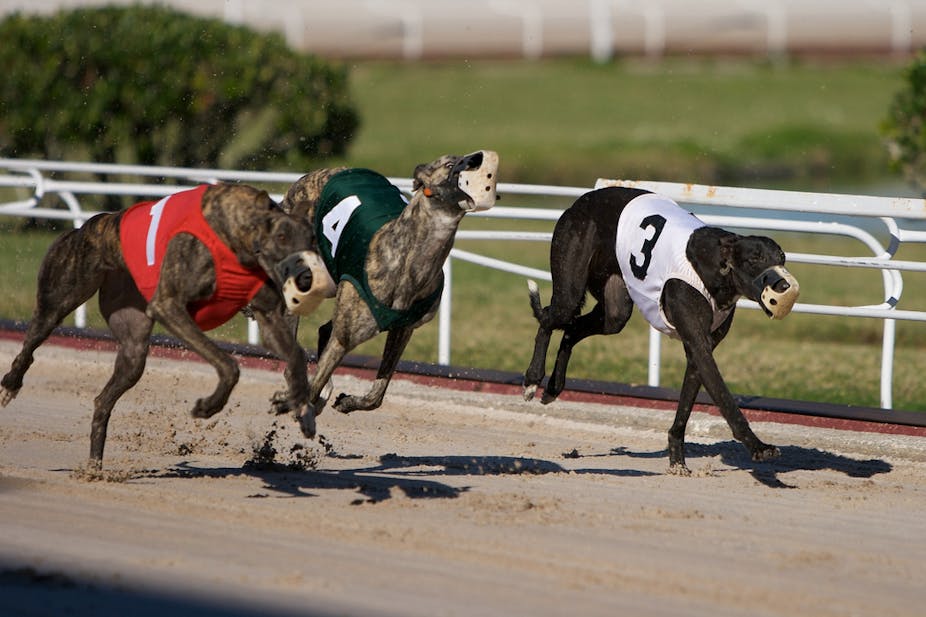Now that Victoria and Queensland have reported on their inquiries into the greyhound racing industry, it is timely to consider the findings of the reports and their implications for the animal industries of Australia.
Compared with the Victorian investigation, the Queensland investigation had more far-reaching conclusions and led to the disbanding of the entire Racing Queensland structure.
The Victorian report criticised the regulatory framework, but the Queensland report found this to be adequate.
However, there was evidence of “conflicts of interest” within Greyhound Racing Victoria, “due to family and personal connections in the industry”. The commissioner’s report says that this should be outlawed in the Rules of greyhound racing.
According to the report, the racing body also told at least one welfare officer to adopt a “softly-softly” approach to welfare issues.
In Queensland the MacSporran report criticised the Office of Racing for failing “to identify that Racing Queensland’s activities in relation to monitoring, investigating, and reporting about compliance and integrity issues were lacking”.
So a notable difference between the two sets of findings was that the Victorian report supported Greyhound Racing Victoria’s monitoring of welfare issues as adequate, whereas the Queensland report criticised Racing Queensland for not adequately inspecting racing facilities and dealing with welfare issues.
Both conclude that the prevalence of live baiting could not be determined, but was more than just an occasional incidence.
And crucially, both reviews come to the landmark conclusion that the control of all racing in the states, greyhound, horse and harness, should be divided into separate commercial and integrity bodies.
Cruelty everywhere
Cruelty exists in all spheres of our interactions with animals but the fact that the creation of an independent integrity controlling body occurred first within the racing industry may be no coincidence.
The inherent cruelty involved in racing – not just in illegal activities such as live baiting, but also in sanctioned practices such as the routine thrashing of racehorses during races – is an inevitable consequence of the major financial returns attached to winning.
There are lessons for our other animal industries, where the lure of financial returns may also lead some to cruel practices. The Farmer report into the 2011 exposé of cruel slaughter of Australian animals overseas in Indonesia accepted that there were serious concerns about the techniques used in Indonesia.
Since that time there have been many revelations of similarly cruel practices, despite the introduction of the Exporter Supply Chain Assurance System to ensure that Australian exporters can trace their animals and demonstrate that they are treated according to World Animal Health slaughtering standards.
World Animal Protection, the leading international animal welfare advocacy group, places Australia firmly in the second class category in its international comparison of animal welfare control, below much of the EU but above the US
As a result of ongoing concerns there have been repeated calls for an independent approach to controlling animal cruelty in the livestock trades, which mainly sends sheep to the Middle East and cattle to Southeast Asia. Meat and Livestock Australia claims that the Australian live export industry has the “world’s highest animal welfare standards for livestock export”.
However Australia’s major rival for sheep trade in the Middle East is Sudan, and India in the case of cattle exported to South Asia. India receives the same rating as Australia from World Animal Protection, and Sudan is not rated.
The management of farm animal cruelty is largely in the domain of agriculture departments in nearly all states and in federal government. These have a mandate to support the agricultural industry.
Hence many cruel practices, such as the mulesing of sheep, dehorning of cattle, debeaking of hens and teeth clipping in pigs, are exempt from cruelty legislation because they deemed “necessary”. There has been a parliamentary proposal for independent management of animal welfare, which would wrest its control from bodies with a vested interest.
Public willing to pay
Consumer ability to discriminate between products from animals kept at different welfare standards is another facet of independent management of animal welfare that is becoming increasingly important. Only this week the state and territory trade ministers met to discuss national standards for free range hens. The Australian Competition and Consumer Commission also has an important role in this process.
Financial independence should be mandatory for any body with responsibility for animal management.
This comes at a cost, but the Australian public have demonstrated over and over again that they would be willing to pay this. Concern over animal cruelty is at an all time high, the public are increasing their purchases of products they consider to be from animals with good welfare – eggs and cosmetics to name but two.
The trouble is that animals don’t vote and politicians still believe that every person in the community only selects the candidates and party that will give him or herself the highest disposable income.

